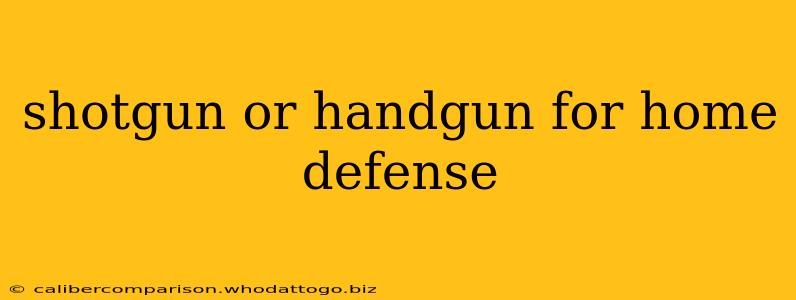Choosing a firearm for home defense is a deeply personal and serious decision. It requires careful consideration of various factors, including your experience level, physical capabilities, and the specific layout of your home. This article will delve into the key differences between shotguns and handguns in a home defense context, helping you make an informed choice.
Shotguns: The Pros and Cons
Shotguns, particularly pump-action or semi-automatic models, have long been a popular choice for home defense. Their advantages stem from their inherent power and stopping power.
Advantages:
- Stopping Power: A shotgun blast delivers multiple projectiles, significantly increasing the likelihood of incapacitating a threat. The spread of the shot also compensates for less-than-perfect aim in a high-stress situation.
- Intimidation Factor: The sound of a shotgun being racked is often enough to deter an intruder. The visual impact of the weapon itself can also be a significant deterrent.
- Effective at Close Range: Shotguns are devastatingly effective at close range, which is typical in home defense scenarios.
Disadvantages:
- Overpenetration: Shotgun pellets can travel far beyond the intended target, posing a significant risk to innocent bystanders or neighbors. This is especially true with larger gauges (e.g., 12 gauge).
- Recoil: Shotguns can have significant recoil, especially for less experienced shooters. This recoil can impact accuracy and make follow-up shots difficult.
- Reloading Time: Depending on the type of shotgun, reloading can be slower than with a handgun, leaving you vulnerable during a critical moment.
- Storage and Handling: Shotguns are generally larger and more cumbersome to store and handle than handguns.
Handguns: The Pros and Cons
Handguns offer a different set of advantages and disadvantages compared to shotguns.
Advantages:
- Ease of Use and Handling: Handguns are generally easier to manipulate and control, especially for individuals with less upper body strength or smaller builds.
- Faster Reloading: Handguns typically have faster reload times than shotguns.
- Concealability: While not the primary concern in home defense, handguns are far more easily concealed than shotguns.
- Less Recoil (Generally): Compared to shotguns, many handgun calibers offer significantly less recoil.
Disadvantages:
- Lower Stopping Power: Handguns typically deliver less stopping power than shotguns, requiring more precise shots to effectively neutralize a threat.
- Higher Skill Requirement: Effective handgun use demands more precise aim and trigger control than shotgun shooting.
- Limited Capacity: Handguns typically hold fewer rounds than shotguns, requiring more frequent reloading.
Choosing the Right Weapon: Factors to Consider
Ultimately, the best choice depends on your individual circumstances. Consider these factors:
- Experience Level: If you're a novice shooter, a handgun might be easier to learn and master. However, proper training is crucial regardless of your chosen firearm.
- Physical Capabilities: Consider your strength, dexterity, and overall physical condition when selecting a weapon.
- Home Layout: The layout of your home will influence the range at which you might engage a threat.
- Ammunition Selection: Research different ammunition types and their potential for overpenetration.
Conclusion: Training is Paramount
Regardless of whether you choose a shotgun or a handgun for home defense, comprehensive training is absolutely paramount. Practice regularly to become proficient in handling your firearm safely and effectively. This includes proper storage, safe handling techniques, and realistic scenario training. Consulting with a firearms instructor is strongly recommended. The safety of yourself and those around you should always be your top priority. This information is for educational purposes only and should not be considered professional advice. Always consult with a qualified firearms instructor and legal professional before making any decisions related to firearm ownership and use.

